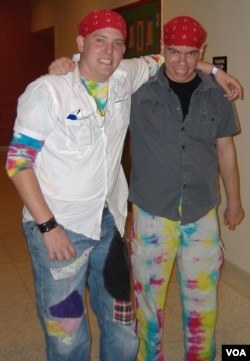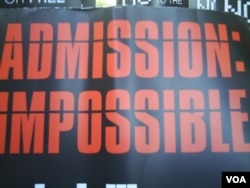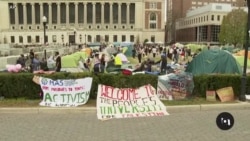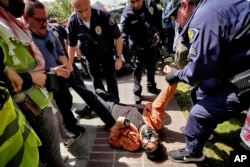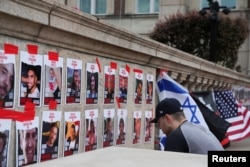Student Union
I Am On My Way....To Graduate School!
What then?
Well, in truth, I have known for a while now which path I wanted to pursue. I have been interested in politics and international affairs for a long time and would like to be a part of that world, whether in terms of policy and decision-making or analysis and commentary. So it wasn’t too hard for me to decide to look for master’s programs in that field. I know politics can be a real pain – both for the politician as well as the citizen – but it’s the one sphere, I feel, where I can achieve a meaningful impact.
As far as research into institutions went, the APSIA website (Association of Professional Schools of International Affairs) was a good place to start. I can’t say I did much beyond that, as that website listed many top institutions. I did also have a look at Ivy League colleges, and – I must confess, even though this is a blog of international students in America – that I looked at options in other countries as well.
GRE and TOEFL
One of the earliest steps in the process involved that peculiar practice in the U.S. of taking standardized tests and exams. I don’t want to be one to complain, but the truth is that the purpose (and definitely the price) of the GRE did not make much sense to me. I managed to take it over the summer in Armenia, though, before senior year, so at least I did not have to spend any time on it during the school year.
Proving English-language capability was fortunately not an issue for me, as my undergraduate studies are in English.
Application Process
Most of the universities where I applied had an almost-exclusively online admissions process. In fact, most of them had outsourced to the same company or software, so the way their websites were setup was similar. But I learned a great deal about the universities just by the admissions process itself, especially looking at what kind of questions those various places asked, what kind of demands they put on their applicants.
It seemed to me that some universities wanted extra reassurances from their applicants that they would be able to pay for their studies. Not that any university did not want such guarantees, but pushing that question was a bit of a turnoff for me.
Contrary to that, only one out of the six places where I applied asked for writing samples. That was really cool. They were also the ones who had real, live human beings respond to my e-mail inquiries within a matter of days. It’s little things like that which leave a lasting, positive impact.
Letters of Recommendation
The letters of recommendation are also a very important aspect of applications. People tend to be busy, so it is useful to remind your recommenders every once in a while to go on to that website and to submit that letter. I found a gentle reminder e-mail once every couple of weeks or so was enough. It is also a good idea to get an early start on your recommenders, so that they have the time to craft a meaningful letter.
I was fortunate in picking a couple of people at my college who I knew shared my interests and also with whom I had had helpful interactions over the past few years, including discussions on politics and international affairs. My third recommender was a mentor and internship boss of mine back in Armenia, so she had seen my “real life” work (as opposed to my academic work) and could speak to that.
If you are graduating soon, but if you won’t be applying for further study this coming year, I’d recommend asking a favorite professor to have a letter of recommendation on file, just as a reference in case of future need, because your professor may not remember as many details about your conduct in class or your character after a year or two.
Financial Aid
Even though the online applications were really similar, many of the universities to which I applied had entirely separate processes for financial aid, which required almost just as much work as the application itself.
I was told that it is difficult to get funding at the graduate level in humanities or social sciences, and, yes, as it turns out, the financial aid has not come to much, at least not as much as the support I'm receiving now for college. Still, every little bit helps, and I am grateful for the assistance.
Personal Statement
I like to think that the personal statement is the most important part of the admissions packet, so I worked really hard to highlight my strong points and to elaborate on why the place where I was applying was suitable for my choice of career and academic interest.
But I tried to be concise as well, as I imagine those universities get thousands and thousands of applicants with only a handful of staff to sort through them. They all put word limits, as a matter of fact, so the choice of words had to be careful too.
Different Paths
I have noticed that many of my fellow-seniors are not sure what path they wish to pursue. A lot will not be going on to graduate school. This seems to be a pretty normal thing around here. Work experience, internships, volunteer work or international experiences are a big plus, in fact, when applying to master’s programs. But I’d had all that before I came to the States, “in-between-schools,” as the saying would go. Since I already had a good idea of my choice of career, taking on this next challenge seemed like the right thing to do.
And that is very significant: to be aware of what it is exactly you want to do with your life. Finding the exact place or program that fits those aspirations comes second. There is an immense diversity of colleges and universities in this country, which is a great luxury. So, I’d say take your time, look into various possibilities, and apply to as many as you can. It will take effort and patience (and, with application fees, a bit of money just to try), but I like to think that it will be a worthwhile investment.
But I won't be able to tell you for sure until a couple of years or more down the road.
See all News Updates of the Day
- By VOA News
What types of graduate student housing are there?
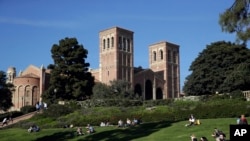
Anayat Durrani of the US News & World Report breaks down the options. (April 2024)
Pro-Palestinian protests spread on US university campuses
U.S. university campuses are seeing pro-Palestinian protests daily. Students are demonstrating against the Israel-Hamas war in Gaza and demanding that humanitarian aid be allowed to flow into the territory. VOA’s Veronica Balderas Iglesias reports.
US police clash with students who demand colleges cut financial ties to Israel
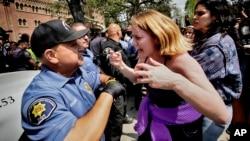
Police tangled with student demonstrators in the U.S. states of Texas and California while new encampments sprouted Wednesday at Harvard and other colleges as school leaders sought ways to defuse a growing wave of pro-Palestinian protests.
At the University of Texas at Austin, hundreds of local and state police — including some on horseback and holding batons — clashed with protesters, pushing them off the campus lawn and at one point sending some tumbling into the street. At least 20 demonstrators were taken into custody at the request of university officials and Texas Governor Greg Abbott, according to the state Department of Public Safety.
A photographer covering the demonstration for Fox 7 Austin was arrested after being caught in a push-and-pull between law enforcement and students, the station confirmed. A longtime Texas journalist was knocked down in the mayhem and could be seen bleeding before police helped him to emergency medical staff who bandaged his head.
At the University of Southern California, police got into a back-and-forth tugging match with protesters over tents, removing several before falling back. At the northern end of California, students were barricaded inside a building for a third day at California State Polytechnic University, Humboldt. The school shut down campus through the weekend and made classes virtual.
Harvard University in Massachusetts had sought to stay ahead of protests this week by limiting access to Harvard Yard and requiring permission for tents and tables. That didn't stop protesters from setting up a camp with 14 tents Wednesday following a rally against the university's suspension of the Harvard Undergraduate Palestine Solidarity Committee.
Students protesting the Israel-Hamas war are demanding schools cut financial ties to Israel and divest from companies enabling its monthslong conflict. Dozens have been arrested on charges of trespassing or disorderly conduct. Some Jewish students say the protests have veered into antisemitism and made them afraid to set foot on campus.
Columbia University averted another confrontation between students and police earlier in the day. The situation there remained tense, with campus officials saying it would continue talks with protesters for another 48 hours.
On a visit to campus, U.S. House Speaker Mike Johnson, a Republican, called on Columbia University President Minouche Shafik to resign "if she cannot bring order to this chaos."
"If this is not contained quickly and if these threats and intimidation are not stopped, there is an appropriate time for the National Guard," he said.
Shafik had set a midnight Tuesday deadline to reach an agreement on clearing an encampment, but the school extended negotiations, saying it was making "important progress."
On Wednesday evening, a Columbia spokesperson said rumors that the university had threatened to bring in the National Guard were unfounded. "Our focus is to restore order, and if we can get there through dialogue, we will," said Ben Chang, Columbia's vice president for communications.
Columbia graduate student Omer Lubaton Granot, who put up pictures of Israeli hostages near the encampment, said he wanted to remind people that there were more than 100 hostages still being held by Hamas.
"I see all the people behind me advocating for human rights," he said. "I don't think they have one word to say about the fact that people their age, that were kidnapped from their homes or from a music festival in Israel, are held by a terror organization."
Harvard law student Tala Alfoqaha, who is Palestinian, said she and other protesters want more transparency from the university.
"My hope is that the Harvard administration listens to what its students have been asking for all year, which is divestment, disclosure and dropping any sort of charges against students," she said.
Columbia encampment inspires others
Police first tried to clear the encampment at Columbia last week, when they arrested more than 100 protesters. The move backfired, acting as an inspiration for other students across the country to set up similar encampments and motivating protesters at Columbia to regroup.
On Wednesday about 60 tents remained at the Columbia encampment, which appeared calm. Security remained tight around campus, with identification required and police setting up metal barricades.
Columbia said it had agreed with protest representatives that only students would remain at the encampment and they would make it welcoming, banning discriminatory or harassing language.
On the University of Minnesota campus, a few dozen students rallied a day after nine protesters were arrested when police took down an encampment in front of the library. U.S. Representative Ilhan Omar, whose daughter was among the demonstrators arrested at Columbia last week, attended a protest later in the day.
A group of more than 80 professors and assistant professors signed a letter Wednesday calling on the university's president and other administrators to drop any charges and to allow future encampments without what they described as police retaliation.
They wrote that they were "horrified that the administration would permit such a clear violation of our students' rights to freely speak out against genocide and ongoing occupation of Palestine."
Netanyahu encourages police response
Israeli Prime Minister Benjamin Netanyahu lashed out at the pro-Palestinian demonstrations on U.S. college campuses in a video statement released Wednesday, saying the response of several university presidents has been "shameful" and calling on state, local and federal officials to intervene.
Students at some protests were hiding their identities and declined to identify themselves to reporters, saying they feared retribution. At an encampment of about 40 tents at the heart of the University of Michigan's campus in Ann Arbor, almost every student wore a mask, which was handed to them when they entered.
The upwelling of demonstrations has left universities struggling to balance campus safety with free speech rights. Many long tolerated the protests, but are now doling out more heavy-handed discipline, citing safety concerns.
At New York University this week, police said 133 protesters were taken into custody and all had been released with summonses to appear in court on disorderly conduct charges. More than 40 protesters were arrested Monday at an encampment at Yale University.
Columbia University demonstrators in talks with administration officials
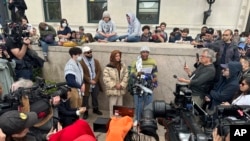
Officials at Columbia University were continuing talks Wednesday with student demonstrators from the Gaza Solidarity Encampment as the protest reaches a full week.
At 9:41 p.m. Tuesday, university President Nemat “Minouche” Shafik sent an email to the Columbia community setting a midnight deadline for an agreement to be reached about dismantling the encampment and dispersing the protesters.
“I very much hope these discussions are successful,” she wrote. “If they are not, we will have to consider alternative options for clearing the West Lawn and restoring calm to campus so that students can complete the term and graduate.”
As midnight passed, Columbia University Apartheid Divest posted a statement on X saying, “We refuse to concede to cowardly threats and blatant intimidation by university administration. We will continue to peacefully protest.”
The statement also said the university had threatened to call the National Guard. But after visiting the university earlier in the week, New York Governor Kathy Hochul said Tuesday she had no plans to deploy the National Guard.
As midnight approached on Tuesday, a student organizer announced that the deadline had been extended to 8 a.m. Wednesday.
At 4:09 a.m., the Office of the President sent an email saying the discussion deadline would be extended for 48 hours, given the constructive dialogue, and the university would report back on progress.
The email announced that leaders of the student encampment had agreed to remove a significant number of tents, get non-Columbia affiliates to leave the encampment and comply with New York Fire Department requirements. They also agreed to ensure that the encampment is “welcome to all” and to prohibit “discriminatory or harassing language.”
This development comes nearly a week after more than 100 students were arrested at the school on April 18, after Shafik authorized police to clear away protesters. Some of the students received suspension notices from the school.
Columbia’s action prompted an onslaught of pro-Palestinian demonstrations at other universities and responses from faculty and politicians.
Students at other campuses, such as Yale, Stanford and New York University, have also rallied around the Palestinian cause, calling for their universities to divest from companies with ties to Israel and for a cease-fire in Gaza. Many also have put up tent encampments on their campuses. About 150 students and faculty were arrested at New York University Monday night.
Columbia also announced Tuesday morning that classes on the Morningside main campus, where the protests are taking place, will be offered in a hybrid format for the remainder of the spring semester. The last day of classes is April 29.
- By VOA News
Paper: International students faced extra pandemic challenges
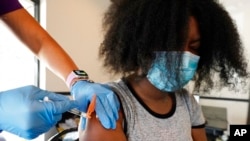
Astrobites, which describes itself as "a daily astrophysical literature journal written by graduate students in astronomy since 2010," focuses on the challenges international students faced during the COVID-19 pandemic.
It examines a paper published in the Journal of Comparative & International Higher Education entitled The Impact of the COVID-19 Pandemic on International Students in a Public University in the United States: Academic and Non-academic Challenges.
Read the Astrobites article here. (April 2024)




